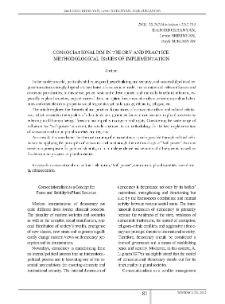Օբյեկտ
Վերնագիր: Consociationalism in Theory and Practice: Methodological Issues of Implementation
Ամսագրի կամ հրապարակման վերնագիր:
Հրապարակման ամսաթիվ:
Հատոր:
Համար:
ISSN:
Համատեղ հեղինակները:
Խ․ Աբովյանի անվան հայկական պետական մանկավարժական համալսարան
Ծածկույթ:
Ամփոփում:
In the modern world, political stability, regional peacebuilding and security, andsuccessful political re-gime transitions strongly depend on the choice of an accurate model that considers all relevant factors and domestic peculiarities. In this sense, peace, sustainable development and mutually beneficial relations,es-pecially in plural societies,requiremore of them, an option for consociationalism concerningcultural iden-tities and other elements proper to social segments such as language, ethnicity, religion,etc. The article explores the theoretical and practical foundations of consociationalism andcultural relativ-ism,which considers the equality of all cultures as a guarantee for common security in plural societies by referringto all human beings‟freedom and equality in dignity and rights. Consideringthe wide range of influence that “soft power” can exert, the article observes it as amethodology for the best implementation of consociationalism in plural societies and regions.As a result, it is concluded that the overcoming of ethnocentrism is only possible through cultural rela-tivismby applying the principles of consociationalism through the methodology of “soft power” that can serve as a prerequisite for political stability, cultural independence and security of all segmentsas well as for democratic progress in plural societies.
Հրատարակության վայրը:
Երևան
Հրատարակիչ:
Ձևաչափ:
Նույնացուցիչ:
oai:arar.sci.am:372031
Լեզու:
Օբյեկտի հավաքածուներ:
Վերջին անգամ ձևափոխված:
Oct 8, 2025
Մեր գրադարանում է սկսած:
Mar 28, 2024
Օբյեկտի բովանդակության հարվածների քանակ:
94
Օբյեկտի բոլոր հասանելի տարբերակները:
https://arar.sci.am/publication/401881
Ցույց տուր նկարագրությունը RDF ձևաչափով:
Ցույց տուր նկարագրությունը OAI-PMH ձևաչափով։
-
Իմաստություն=Wisdom=Мудрость
-
Իմաստություն, 2013, N 1
-
Իմաստություն, 2014, N 1 (2)
-
Իմաստություն, 2014, N 2 (3)
-
Իմաստություն, 2015, N 1 (4)
-
Wisdom, 2015, N 2 (5)
-
Wisdom, 2016, N 1 (6)
-
Wisdom, 2016, N 2 (7)
-
Wisdom, 2017, N 1 (8)
-
Wisdom, 2017, N 2 (9)
-
Wisdom, 2018, N 1 (10)
-
Wisdom, 2018, N 2 (11)
-
Wisdom, 2019, N 1 (12)
-
Wisdom, 2019, N 2 (13)
-
Wisdom, 2020, N 1 (14)
-
Wisdom, 2020, N 2 (15)
-
Wisdom, 2020, N 3 (16)
-
Wisdom, 2021, N 1 (17)
-
Wisdom, 2021, N 1 (1) Special issue
-
Wisdom, 2021, N 2 (18)
-
Wisdom, 2021, N 3 (19)
-
Wisdom, 2021, N 4 (20)
-
Wisdom, 2022, N 1 (21)
-
Wisdom, 2022, N 1 (2) Special issue
-
Wisdom, 2022, N 2 (22)
- Editorial board
- Contents
- Editor`s Foreword
- The Problem of Personal Development in the Context of Social Anomie
- Some Legal Problems in Ensuring Human Security in the Conditions of Information and Psychological Warfare (Second Artsakh War Case)
- The Factor of Consumer Rights Protection as a Criterion for Social System Development
- Socio-Philosophical Phenomenon of the Intelligentsia: The Genesis of the Formation of the Concept
- Coffee Shops as Space for the Cultural Production in Urban Society
- Theoretical and Methodological Aspects of the Humanistic Reorientation of Modern Society
- Alarmism vs Eschatology: Conceptual Analysis (On Material of Ukrainian Discourse)
- Consociationalism in Theory and Practice: Methodological Issues of Implementation
- Transformation of the Phenomenon of Friendship Through the Prism of Network Technologies
- Technological Progress, Artificial Intelligence Development and Ethical Paradigms
- Student’s Psychological Safety in Distance Education During COVID-19: Pros and Cons
- Philosophical Aspects of Determining the Main Components of the Formation of Professional Competence for Students
- Educational Activities in the Context of the Realities of the Information Society: Problems, Pro-spects
- The Negative Factor of Islamic Mentality and Value System in Integration Processes of Muslim Communities in Western Europe
- Philosophical and Sociological Nature of the Indonesian Maubesi People’s Natoni Religion
- Identification of Hedging Strategies in Business Negotiations
- Corporeality Narrative in Ukrainian Literature: Culturosophical Aspect
- Interpretation of Keywords as Indicators of Intertextuality in English New Testament Texts (Antconc Corpus Manager Toolkit)
- Money Phenomenon as a Value-Based Self-Identification: Speech Semantics, Communicative Culture, Philosophical Meanings
- Legal Conscience and the Pressure of the Formal Law System
- Philosophical and Legal Foundations of the Formation of the Legal Consciousness of an Indi-vidual in the Conditions of Training a Lawyer
- Characteristic of Features of the Philosophical and Legal Paradigm of Control in the Context of the Philosophy of Law
- The Problem of State Understanding and Paradigm Bases of its Types
- Interpretation of Fate and Guilt in Armenian and European Epics
- Game in Philosophy of Jean Baudrillard: Limits of Understanding
- Notes to Contributors
- Authors
-
Wisdom, 2022, N 2 (3) Special issue
-
Wisdom, 2022, N 3 (23)
-
Wisdom, 2022, N 3 (4) Special issue
-
Wisdom, 2022, N 4 (24)
-
Wisdom, 2023, N 1 (25)
-
Wisdom, 2023, N 2 (26)
-
Wisdom, 2023, N 3 (27)
-
Wisdom, 2023, N 4 (28)
-
Wisdom, 2024, N 1 (29)
-
Wisdom, 2024, N 2 (30)
-
Wisdom, 2025, N 1 (31)
-
Wisdom, 2025, N 2 (32)
-
Իմաստություն, 2013, N 1
| Հրատարակության անուն | Ամսաթիվ |
|---|---|
| Ordukhanyan, Emil, Consociationalism in Theory and Practice: Methodological Issues of Implementation | Oct 8, 2025 |





